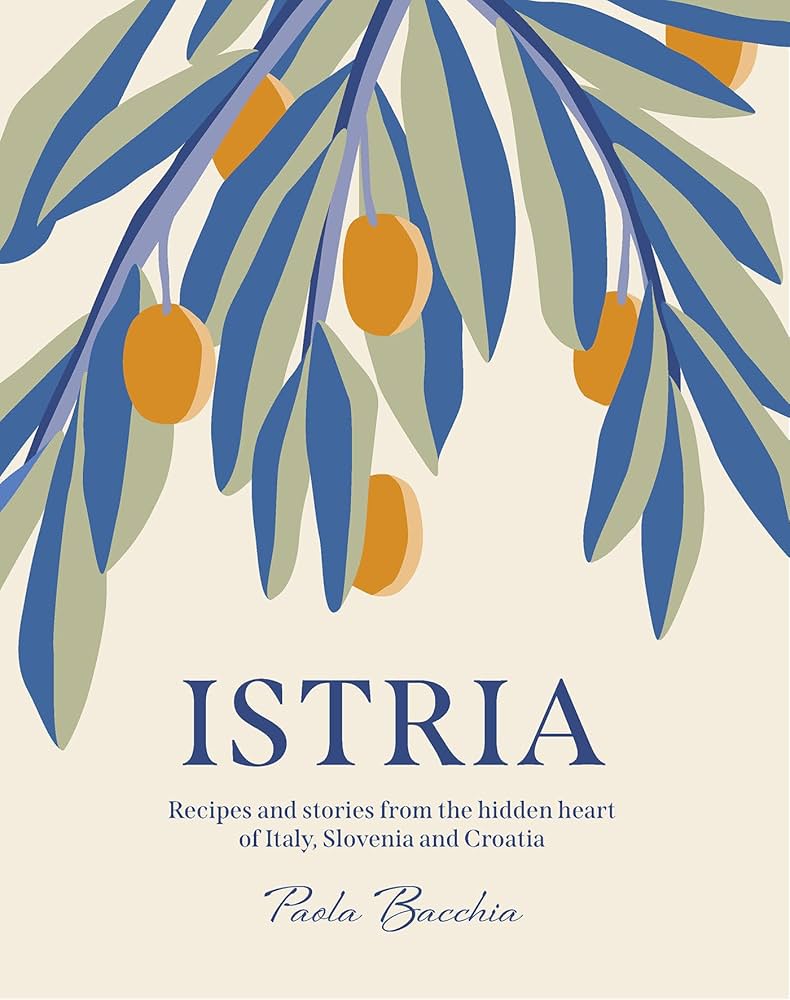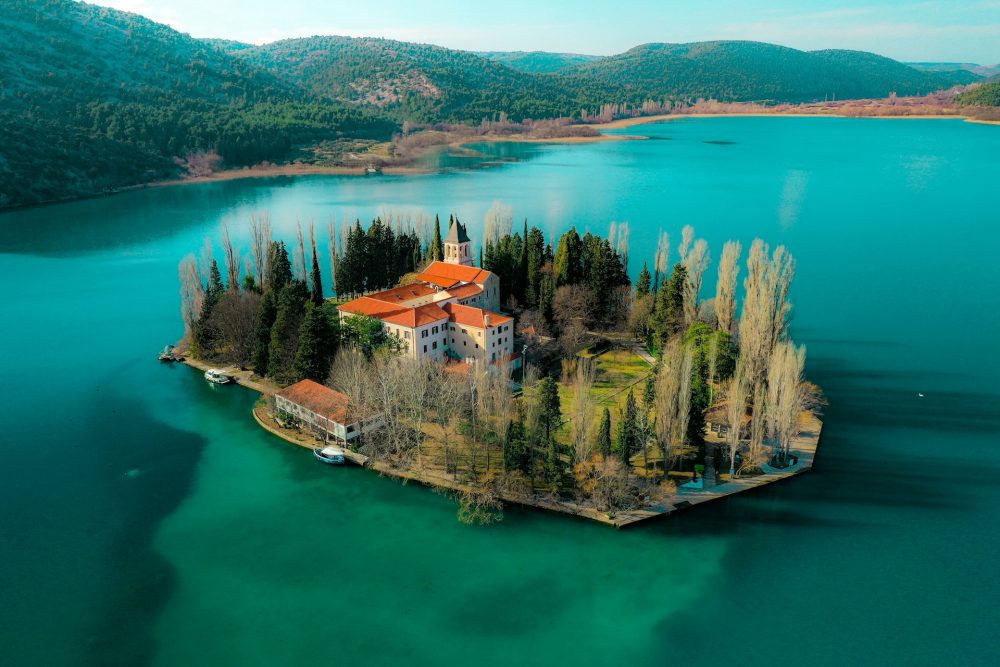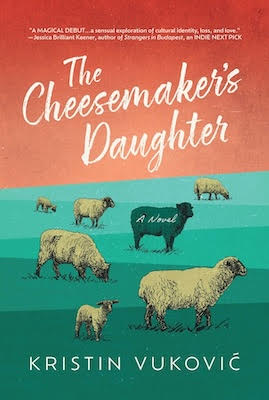I first visited Croatia in 2000, drawn to the place my grandparents were from, the language they spoke, and the food I tasted in their Dayton, Ohio home. I’ve since been more than two dozen times—including for my wedding!—and have written about everything from night-foraging for truffles, how Croatia invented the cravat (tie), the “healing island” of Lošinj, the dramatic vineyards of Dalmatia, and the world-renowned, singularly herbaceous and utterly delicious cheese, Paški sir, from the island of Pag.
Yet while Croatia contains so much beauty and delectable experiences, its recent past saw enormous upheaval. The war in the former Yugoslavia in the 1990s ultimately resulted in the emergence of six independent countries. The aftermath of the war remains deeply felt within families and communities, in places with new borders and complex histories.
In my debut novel, The Cheesemaker’s Daughter, my main character Marina was sent away during the war, a refugee far from her family. Now she has returned to her childhood home on Pag Island to help her father try to save the family’s cheesemaking factory, in the year before Croatia joins the European Union. Struggling to find her footing, she begins to understand more fully the layered emotions and hidden experiences of those who couldn’t escape. As she works to save her father’s legacy, she envisions new ways to integrate the past and present.
While there are countless novels and memoirs set in Italy, just across the deep blue of the Adriatic Sea, there are few books set in Croatia that have been published in the US. Many, like mine, address the challenges of displacement, family secrets, and how the past finds its way into the present. The following books are by authors each with their own signature style, all set in a country that I love and will continue to return to.
Girl at War by Sara Nović
A profoundly affecting story about the lasting trauma of war, Sara Nović’s indelible novel follows Ana Jurić, who is 10 years old when war erupts in Yugoslavia. A decade later, as a college student in New York, Ana returns to the place that changed her family forever. Moving fluidly back and forth in time, Nović vividly captures how war can slowly and then suddenly transform every aspect of life; the complexity of survival; and what it means when you no longer have to carry your history alone.
The Hired Man by Aminatta Forna
Born in Scotland, raised in Sierra Leone and Britain, Aminatta Forna also lived as a child in Iran, Thailand, and Zambia. Her novels, and her own family’s history, delve into the reverberations of conflict. Set in a Croatian town in 2007, The Hired Man opens with a British family who has moved into a house that a local handyman, Duro, knows well. Unlike others in the town, who remain suspicious of the outsiders, Duro helps Laura and her two children settle in. Yet even as he points Laura’s daughter to a concealed mosaic on one wall, his history with the house remains a mystery. But what is buried rarely stays hidden. Forna masterfully reveals, layer by layer, how intense the scars of the war in the former Yugoslavia remain.
Belladonna by Daša Drndić; translated by Celia Hawkesworth
Winner of the 2018 Warwick Prize for Women in Translation, Daša Drndic’s novel was one of Jeff VanderMeer’s favorite books of the past decade. Blending fact and fiction into a masterful mix, Belladonna follows Andreas Ban, a psychologist whose life is disrupted by the war in the former Yugoslavia. When his son leaves to study abroad, Ban is left alone in a coastal Croatian town with only his memories as his body fails. A moving meditation on history and illness, the novel powerfully shows how “the past is riddled with holes.”
Dark Mother Earth by Kristian Novak; translated by Ellen Elias-Bursać
Kristian Novak’s English-language debut, translated by Ellen Elias-Bursać, was awarded the Tportal Prize for Croatian Novel of the Year. In it, Matija, a novelist whose ability to invent stories spills over to his own past, must confront the memories he has tried to erase completely — including the death of his father and the mystery of a suicide cluster in his village after the start of the war. Novak compellingly explores the dislocation and unmooring that can impact a child whose grief is given no space or answer.
Our Man in Iraq by Robert Perišić; translated by Will Firth
A deceiving title for this list, Perišić’s satirical novel is indeed set in Croatia – in 2003, the year Croatia applied to become part of the European Union and the United States invaded Iraq. Through a series of absurd situations, Toni, a journalist based in Zagreb, volunteers his Arabic-speaking cousin Boris to report from Iraq. When Boris goes missing, Toni’s world also begins to unravel. Darkly humorous, Perišić’s novel unearths how impossible it is to escape the long shadow of war.
We Trade Our Night for Someone Else’s Day by Ivana Bodrožić; translated by Ellen Elias-Bursać
Nora has returned to her hometown as a journalist in this noir set in a still deeply divided Croatian city years after the end of the war in the former Yugoslavia. Assigned to a story involving a Croatian teacher and Serbian student, Nora finds herself turning to the mysterious circumstances of her father’s murder years previous. Bleak and engrossing, Bodrožić’s novel explores how generations remain impacted by the wounds of a place that has witnessed so much horrific violence.
Farewell, Cowboy by Olja Savičević; translated by Celia Hawkesworth
Wild, surreal (including a film crew shooting a western on the Adriatic coast), and also deeply serious, Savičević’s novel features a woman, Dada, searching for the reason behind her brother’s apparent suicide near their hometown. With no easy answers or tidy conclusion, Savicevic’s work explores how embedded the war in the former Yugoslavia remains in the everyday lives of Croatians.
The First Rule of Swimming by Courtney Angela Brkic
The debut novel by the author of the memoir The Stone Fields and the story collection Stillness explores the legacy of disappearance and betrayal among multiple generations. When her younger sister vanishes in New York, Magdalena leaves her Croatian island home to search for her. Juxtaposing the gorgeous landscape of the Adriatic with the grit and grime of New York City, Brkic beautifully illuminates the intersections of war, love, and loyalty, and how hard it is to escape the machinations of the past.
My Family and Other Enemies by Mary Novakovich
Novakovich’s memoir centers on Lika, where her parents were born. As is true of so many places, Lika is a place of both beauty and brutality. A freelance journalist and travel writer, Novakovich’s research into her family’s complicated history results in a book that abounds with incredible stories of adversity and resilience, and a hearty dose of delicious meals.

Istria by Paola Bacchia
Am I being sneaky adding a cookbook to this list? Perhaps! But food is such a deep part of Croatian culture. Istria, a northern peninsula dangling into the Adriatic Sea, is shared by Croatia, Italy, and Slovenia. The borders there have shifted among countries (many that no longer exist, and many that now do exist); the majority of Istria is Croatia’s today. In addition to the scrumptious dishes, Bacchia includes delectable stories from her family and others in the region – showing how food traverses borders and draws from many different traditions.
Take a break from the news
We publish your favorite authors—even the ones you haven’t read yet. Get new fiction, essays, and poetry delivered to your inbox.
YOUR INBOX IS LIT
Enjoy strange, diverting work from The Commuter on Mondays, absorbing fiction from Recommended Reading on Wednesdays, and a roundup of our best work of the week on Fridays. Personalize your subscription preferences here.

